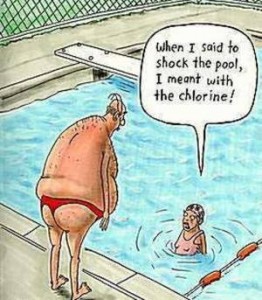It’s important to follow the chemical manufacturers instructions to the letter when handling chemicals and adding them to your pool. When you purchase your pool, the pool professionals will set you up with a system to keep the water clean and healthy, so you can rely on them to help you along the way. They want to be a partner in the health of your pool so you will keep coming back to purchase products.
Without a doubt, if you are doing the water testing yourself, then you will have to add chemicals as well based on your findings. If you are using granular products, there are generally two ways to add them to the water. The first is to add the powders directly to the water. The best way to be sure the powders are evenly dispersed is to slowly pour them in various areas of the pool. Don’t just toss them in from a standing position as the wind may blow the powder back on you. Instead, bend down and gently pour small amounts in the water. The problem with this method is that the powders may take time to dissolve.
Another way to add powdered chemicals is to mix them in pool water drawn directly from the pool in a bucket you designate to be used for this purpose. This way, the powder has time to dissolve before adding it to the water. If you are using liquid chemicals, pour the solution directly into the pool water but avoid splashing. Tablets that are placed in a floating dispenser are another way of adding chemicals. You simply place them in the device that floats around the pool dispersing the chemicals. Whichever method you use, never add the chemicals directly to the skimmer because they could be filtered out in the filter system before they get a chance to circulate in to the pool.
Shocking the pool
After a heavy rainfall, in extreme heat or after a large party where lots of people have been using the pool, you may find it necessary to shock or super-chlorinate the water. This will help eliminate any contaminants. You might notice a strong chlorine odor that is an indicator that you need to shock the water. By shocking, you are adding a larger-than-normal dose of chlorine, which will help balance the water; the odor will dissipate.
Your pool professional can help you determine if your pool needs to be shocked. Testing the water first will also help you decide if you need to super-chlorinate the pool. It will take some time for the water to return to normal chlorinated levels, so it’s best to shock the pool at night after everyone is done swimming so it has time to stabilize.
